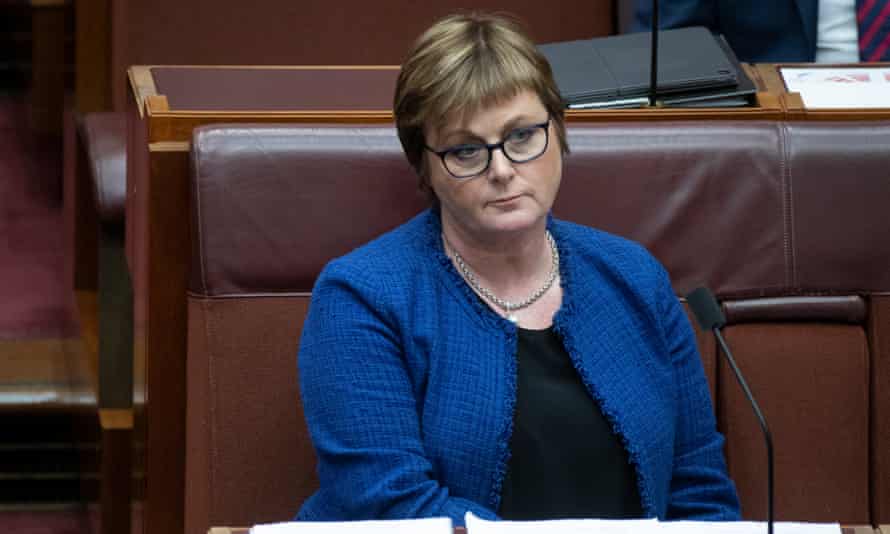Extract from The Guardian
Defence minister’s former staffer is expected to make a police statement about an alleged sexual assault by a colleague in Reynolds’ office

Last modified on Wed 24 Feb 2021 21.28 AEDT
Linda Reynolds has been admitted to the Canberra hospital and will take a period of medical leave after more than a week of escalating controversy over whether she showed an appropriate duty of care to her former staffer, Brittany Higgins.
The Australian defence minister was due on Wednesday to address the National Press Club, the same day Higgins was expected to make a formal statement to police detailing sexual assault allegations against a former colleague when both were employed by Reynolds in 2019.
But the minister’s office released a statement early in the day saying she would take a period of medical leave following “advice from her cardiologist relating to a pre-existing medical condition”.
“As a precautionary measure, Minister Reynolds has this morning been admitted to a Canberra Hospital,” the statement said.
The office said Scott Morrison had phoned Reynolds earlier in the day “to express his concern and sympathy, and to wish her a quick recovery”.
Higgins also wished her former employer well and said she hoped the recovery was speedy. On Twitter, the former staffer said: “Let’s just hope that from this whole horrible situation there will actually be some fundamental reform to the MOP(S) Act for vulnerable staff and improvements to the workplace culture in Parliament House.”
Reynolds’ admission to hospital follows sustained controversy about how the rape allegations were handled by the Morrison government. Higgins said she initially made a complaint to police, but withdrew it in April 2019 because she said she felt pursuing it would end her career in political staffing.
The defence minister has acknowledged she made errors in the aftermath of the incident, including debriefing Higgins in the same room where she says she was assaulted.
But Reynolds has insisted she was motivated at all times by respecting Higgins’ privacy. The defence minister has dug in, declining to answer a series of questions on the detail of the incident – including whether the staffer alleged to have assaulted Higgins left with a termination payout or with references to assist future employment.
The home affairs minister, Peter Dutton, has also refused to say whether federal police followed “standard practice” for politically sensitive matters and notified his office of the rape allegation “at the earliest opportunity” after the former staffer made a complaint.
Higgins has alleged she was assaulted in Reynolds’ ministerial office on the night of 22 March by a more senior colleague.
The former staffer told Guardian Australia she gave an informal statement to police at Parliament House on 27 March after disclosing her recollections to Reynolds’ then-chief of staff the previous day. Reynolds also spoke separately to the AFP about the matter.
Internal federal police guidelines suggest that at the time Higgins spoke to police, officers were compelled to alert the home affairs minister “at the earliest opportunity” to any “politically sensitive” matter – unless there was a clear conflict of interest in doing so.
Politically sensitive matters include an investigation likely to be of “particular interest” to MPs, the government, or the media. The alleged rape of a staffer by a co-worker in a minister’s office would have met this threshold.
Reynolds, who has been under intense pressure since news of the alleged rape broke last Monday, came unstuck on Tuesday while answering questions in the Senate about her handling of the alleged crime in March 2019.
Reynolds was questioned about her meetings with police and on two separate occasions told the upper house she had met police twice – an answer she was later forced to correct.
Morrison has also been under pressure about the knowledge of his staff. Morrison has repeatedly said his office first became aware of the rape allegation on 12 February. But one of the prime minister’s current staffers, Fiona Brown, knew about the allegation because she managed Higgins in the aftermath when working as chief of staff to Reynolds.
Brown worked for Morrison before she worked for Reynolds, who was the defence industry minister at the time, then returned to Morrison’s office after the 2019 election.
Guardian Australia this week confirmed that a second staffer now employed in the prime minister’s office knew details about the termination of Higgins’ former colleague because that senior aide was employed as an adviser to Alex Hawke when Hawke was special minister of state.
Late last week, new text messages were reported by the Australian suggesting that a friend of Higgins got in touch with the prime minister’s office to alert them to the flawed handling of her case in early April 2019.
After the texts emerged, and after Higgins claimed that one of Morrison’s senior political advisers, Yaron Finkelstein, had also “checked in” with her at the time the ABC’s Four Corners program aired an investigation of Parliament House culture in 2020, Morrison said his department head, Phil Gaetjens, needed to audit staff communications.
The government has launched four inquiries in the wake of the Higgins allegations. That includes two inquiries into workplace culture, one into the support available for parliamentary staff. There’s also a police investigation.
The inquiry headed by Gaetjens is examining what Morrison’s office knew of the allegations and when. Gaetjens is Morrison’s former chief of staff.
Separate to the Higgins controversy, the government is also battling a second set of allegations involving the office of the MP Craig Kelly, who defected from the government to the crossbench on Tuesday.
Before his defection, a senior staffer employed by Morrison asked Kelly to remove a senior aide who is now the subject of an apprehended violence order and allegations of inappropriate behaviour by young interns. The senior aide denies the allegations.
No comments:
Post a Comment